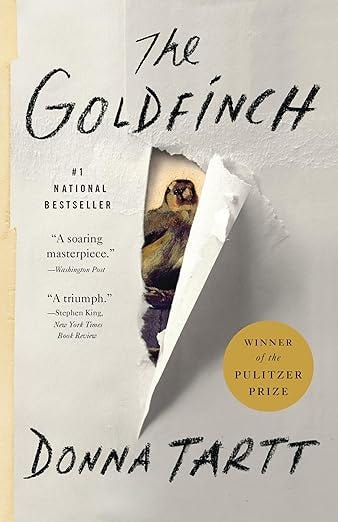The Goldfinch
of longing and nostalgia
Everything in life has meaning. Every person we meet, every incident, every place we visit, every misfortune which hits us, every glee we go through, every night we cry through, every failure we chin up too, every hand we extend unasked for, every time we turn away from our generosity, every time we stop, turn back and let our natural goodness find its flow. Everything.
We will never know the true meaning of what has occurred until we are finally in a position to look back and see how things have all fallen into place. Nothing in life's tapestry ever misses its complex design intent.
The Goldfinch is about a lot of these things.
Theo loses his mother in a terrorist attack, in Metropolitan Museum of Art, and it's pretty much like the end of his world. But an urging from a dying man to take a painting away, and a ring he presses into his hand, lay out the map for an intriguing and uncharted future. Theo is impressionable and vulnerable, but even as the horror of his mother's death haunts him, he opens up to whatever life gives him. And the bonds he makes, over art, over silence, over antique furniture, over drugs, takes him irrevocably into worlds with semblances of both heaven and hell.
In a book written with such exactitude and detail that the reader can smell, see, feel the man and the milieu, the glory of its greatness comes from its precise sketches of people, and how circumstances are circumcised, cozened or chiseled by what we are.
Like the best of stories - and the people in our lives - there's a wonderful avoidance of judgement, and the worst of characters are fried by the writer in a crucible of understanding.
And even as we learn of art and furniture restoration and betting and the physiology of drugs, and move from the wonderfully depicted windblown streets and plush living rooms of New York to the desolate suburbs of Las Vegas, where the air itself sweeps away all good from an aching confused soul, we are given permission to see the privations and perfidy of love.
But the immensity of the novel comes particularly from its addressal of longing and nostalgia. Ensconced within these are the stories of Theo's mother, whose presence looms through the story even in its absence, and that of Pippa, Theo's only true love. In the sadness of their fractured lives, lies their desperate search for meaning. And as Boris, Theo's irrepressible friend says, some of the best things in life happen because of the worst happenstances, and often good things are done with the worst of results. It is both life's blessing and bane. And in Hobie, an immense character, and Theo's unquestioning refuge, as massive in heart as his body was, lies the symbol of warmth and safety, a place which all of us seek in our lives, a nook where we can curl and sleep like a baby in the worst of our times.
In the end, the novel folds into itself, as Theo begins to understand that forces of fortune are merely our assistants to establish the milestones of our journey - and the goldfinch, which lay tied to its perch, was also holding him captive. Its release was life's message to him to finally find a safe passage inside himself.
Have you read these extraordinary books, which I talked about?
The Silkworm, City of Girls, Damage, Caravan to Vacarres, A Gentleman in Moscow, Eat, Pray, Love; Sea Prayer, The Winter of Our Discontent
I write, so you can enjoy and expand your world. Would you like to support me? Well, here’s what you can do -
share this post -
subscribe if you still haven’t -
tell me of your thoughts -

